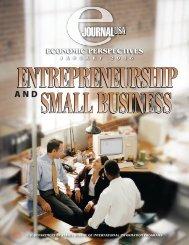s. history us history us history - Embassy of the United States
s. history us history us history - Embassy of the United States
s. history us history us history - Embassy of the United States
- No tags were found...
You also want an ePaper? Increase the reach of your titles
YUMPU automatically turns print PDFs into web optimized ePapers that Google loves.
CHAPTER 4: THE FORMATION OF A NATIONAL GOVERNMENTOUTLINE OF U.S. HISTORY“Every man, andevery body <strong>of</strong> men on Earth,possesses <strong>the</strong> right <strong>of</strong>self-government.”STATE CONSTITUTIONSThe success <strong>of</strong> <strong>the</strong> Revolution gaveAmericans <strong>the</strong> opportunity to givelegal form to <strong>the</strong>ir ideals as expressedin <strong>the</strong> Declaration <strong>of</strong> Independence,and to remedy some <strong>of</strong> <strong>the</strong>ir grievancesthrough state constitutions.As early as May 10, 1776, Congresshad passed a resolution advising<strong>the</strong> colonies to form new governments“such as shall best conduceto <strong>the</strong> happiness and safety <strong>of</strong> <strong>the</strong>irconstituents.” Some <strong>of</strong> <strong>the</strong>m hadalready done so, and within a yearafter <strong>the</strong> Declaration <strong>of</strong> Independence,all but three had drawn upconstitutions.The new constitutions showed<strong>the</strong> impact <strong>of</strong> democratic ideas.None made any drastic break with<strong>the</strong> past, since all were built on <strong>the</strong>Drafter <strong>of</strong> <strong>the</strong> Declaration <strong>of</strong> IndependenceThomas Jefferson, 1790solid foundation <strong>of</strong> colonial experienceand English practice. But eachwas also animated by <strong>the</strong> spirit <strong>of</strong>republicanism, an ideal that hadlong been praised by Enlightenmentphilosophers.Naturally, <strong>the</strong> first objective <strong>of</strong><strong>the</strong> framers <strong>of</strong> <strong>the</strong> state constitutionswas to secure those “unalienablerights” whose violation had ca<strong>us</strong>ed<strong>the</strong> former colonies to repudiate<strong>the</strong>ir connection with Britain. Th<strong>us</strong>,each constitution began with a declarationor bill <strong>of</strong> rights. Virginia’s,which served as a model for all <strong>the</strong>o<strong>the</strong>rs, included a declaration <strong>of</strong>principles: popular sovereignty, rotationin <strong>of</strong>fice, freedom <strong>of</strong> elections,and an enumeration <strong>of</strong> fundamentalliberties: moderate bail and humanepunishment, speedy trial by jury,freedom <strong>of</strong> <strong>the</strong> press and <strong>of</strong> con-science, and <strong>the</strong> right <strong>of</strong> <strong>the</strong> majorityto reform or alter <strong>the</strong> government.O<strong>the</strong>r states enlarged <strong>the</strong> list <strong>of</strong>liberties to freedom <strong>of</strong> speech, <strong>of</strong> assembly,and <strong>of</strong> petition. Their constitutionsfrequently included suchprovisions as <strong>the</strong> right to bear arms,to a writ <strong>of</strong> habeas corp<strong>us</strong>, to inviolability<strong>of</strong> domicile, and to equal protectionunder <strong>the</strong> law. Moreover, allprescribed a three-branch structure<strong>of</strong> government —executive, legislative,and judiciary — each checkedand balanced by <strong>the</strong> o<strong>the</strong>rs.Pennsylvania’s constitution was<strong>the</strong> most radical. In that state, Philadelphiaartisans, Scots-Irish frontiersmen,and German-speakingfarmers had taken control. The provincialcongress adopted a constitutionthat permitted every male taxpayerand his sons to vote, requiredrotation in <strong>of</strong>fice (no one could serveas a representative more than fouryears out <strong>of</strong> every seven), and set upa single-chamber legislature.The state constitutions had someglaring limitations, particularly bymore recent standards. Constitutionsestablished to guarantee people<strong>the</strong>ir natural rights did not securefor everyone <strong>the</strong> most fundamentalnatural right — equality. The coloniessouth <strong>of</strong> Pennsylvania excluded<strong>the</strong>ir slave populations from <strong>the</strong>irinalienable rights as human beings.Women had no political rights. Nostate went so far as to permit universalmale suffrage, and even in thosestates that permitted all taxpayers tovote (Delaware, North Carolina, andGeorgia, in addition to Pennsylvania),<strong>of</strong>fice-holders were required toown a certain amount <strong>of</strong> property.THE ARTICLES OFCONFEDERATIONThe struggle with England haddone much to change colonial attitudes.Local assemblies had rejected<strong>the</strong> Albany Plan <strong>of</strong> Union in1754, ref<strong>us</strong>ing to surrender even <strong>the</strong>smallest part <strong>of</strong> <strong>the</strong>ir autonomy toany o<strong>the</strong>r body, even one <strong>the</strong>y <strong>the</strong>mselveshad elected. But in <strong>the</strong> course<strong>of</strong> <strong>the</strong> Revolution, mutual aid hadproved effective, and <strong>the</strong> fear <strong>of</strong> relinquishingindividual authority hadlessened to a large degree.John Dickinson produced <strong>the</strong>“Articles <strong>of</strong> Confederation and PerpetualUnion” in 1776. The ContinentalCongress adopted <strong>the</strong>m inNovember 1777, and <strong>the</strong>y went intoeffect in 1781, having been ratified byall <strong>the</strong> states. Reflecting <strong>the</strong> fragility<strong>of</strong> a nascent sense <strong>of</strong> nationhood,<strong>the</strong> Articles provided only for a veryloose union. The national governmentlacked <strong>the</strong> authority to set uptariffs, to regulate commerce, and tolevy taxes. It possessed scant control<strong>of</strong> international relations: A number<strong>of</strong> states had begun <strong>the</strong>ir own negotiationswith foreign countries. Ninestates had <strong>the</strong>ir own armies, several<strong>the</strong>ir own navies. In <strong>the</strong> absence <strong>of</strong>a sound common currency, <strong>the</strong> newnation conducted its commerce witha curio<strong>us</strong> hodgepodge <strong>of</strong> coins and abewildering variety <strong>of</strong> state and nationalpaper bills, all fast depreciatingin value.6869












